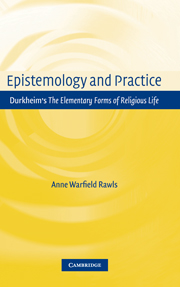Book contents
- Frontmatter
- Contents
- Acknowledgments
- Introduction
- 1 Durkheim's Outline of the Argument in the Introductory Chapter
- 2 Durkheim's Dualism: an Anti-Kantian, Anti-Rationalist Position
- 3 Sacred and Profane: the First Classification
- 4 Totemism and the Problem of Individualism
- 5 The Origin of Moral Force
- 6 The Primacy of Rites in the Origin of Causality
- 7 Imitative Rites and the Category of Causality
- 8 The Category of Causality
- 9 Logic, Language and Science
- 10 Durkheim's Conclusion Section iv: Logical Argument for Social Origin of the Categories
- Conclusion
- Bibliography
- Index
2 - Durkheim's Dualism: an Anti-Kantian, Anti-Rationalist Position
Published online by Cambridge University Press: 22 September 2009
- Frontmatter
- Contents
- Acknowledgments
- Introduction
- 1 Durkheim's Outline of the Argument in the Introductory Chapter
- 2 Durkheim's Dualism: an Anti-Kantian, Anti-Rationalist Position
- 3 Sacred and Profane: the First Classification
- 4 Totemism and the Problem of Individualism
- 5 The Origin of Moral Force
- 6 The Primacy of Rites in the Origin of Causality
- 7 Imitative Rites and the Category of Causality
- 8 The Category of Causality
- 9 Logic, Language and Science
- 10 Durkheim's Conclusion Section iv: Logical Argument for Social Origin of the Categories
- Conclusion
- Bibliography
- Index
Summary
One of the misinterpretations standing in the way of an understanding of Durkheim's epistemology is the belief that he took a Kantian position on dualism. The misinterpretation is consequential in that it supports the claim that he also took a Kantian position on epistemology. Durkheim does take a position on human reason that he refers to as “dualism.” This position is presented, in conjunction with his discussion of epistemology, in the Introduction to The Elementary Forms, and plays a key role in the argument. In fact, Durkheim felt so strongly about the centrality of his position on dualism to the argument of The Elementary Forms as a whole, and was so disappointed that the argument was misunderstood, that, in response to criticism of that book, he wrote an article devoted entirely to an explanation of his position on dualism. The article, “The Dualism of Human Nature and its Social Conditions” was published in 1914, in the journal Scientia two years after the publication of The Elementary Forms.
In the Scientia article Durkheim argued that there are two aspects of each human being: a pre-rational animal being and a rational social, or human, being. These two aspects of the person conflict with one another, producing the internal tension that philosophers across the ages have referred to as dualism. According to Durkheim ([1914]1960:329):
It is this disagreement, this perpetual division against ourselves, that produces both our grandeur and our misery; our misery because we are thus condemned to live in suffering; and our grandeur because it is this division that distinguishes us from all other beings. The animal proceeds to his pleasure in a single and exclusive movement; man alone is normally obliged to make a place for suffering in his life.
- Type
- Chapter
- Information
- Epistemology and PracticeDurkheim's The Elementary Forms of Religious Life, pp. 72 - 107Publisher: Cambridge University PressPrint publication year: 2005

